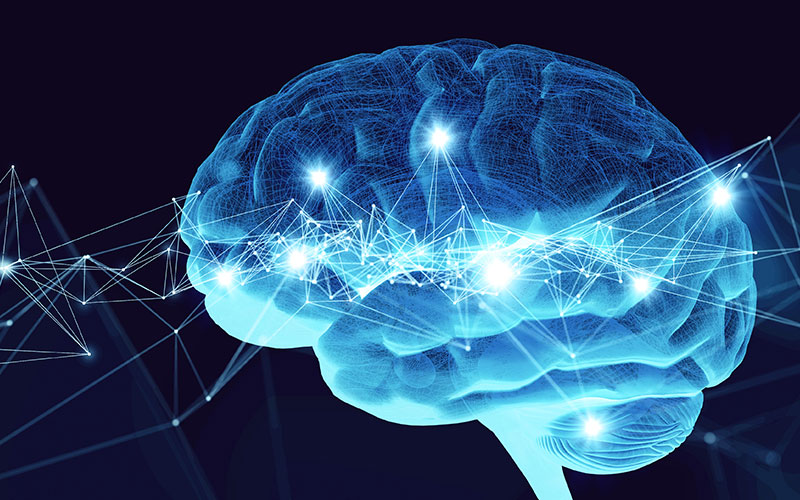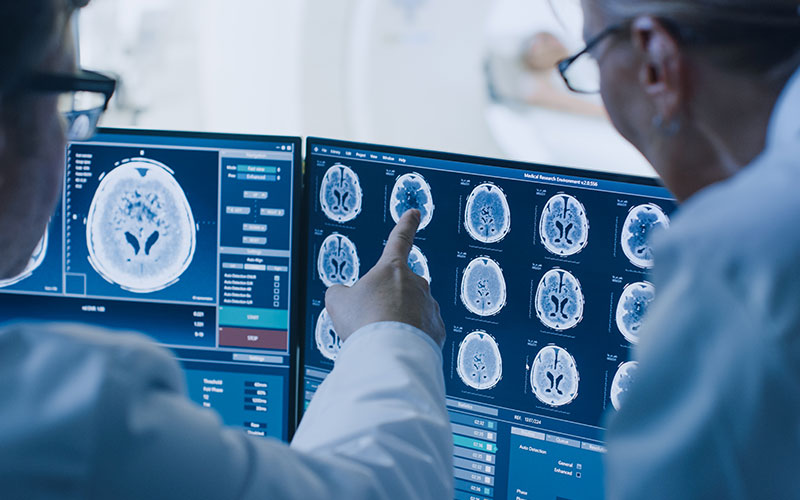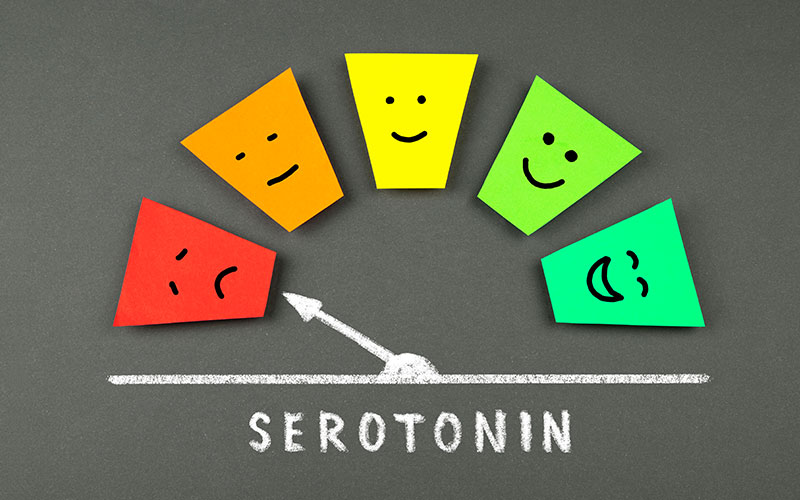- Home
- Growth Hormone
- Growth Hormone
- Growth Hormone Deficiency
- Growth Hormone Therapy
- Growth Hormone Injections
get startedThe Most Effective Hormone Replacement TherapiesTestosterone Replacement and Brain Health
Testosterone replacement therapy has been shown to have a positive impact on mood, memory, cognition, and many other areas of brain health.
Testosterone is a critical hormone. It’s essential for many aspects of a man’s health and wellbeing, including bone and muscle growth, sperm development, and sexual performance. In addition to all these ways in which testosterone contributes towards your physical health, there is one more surprising benefit to testosterone you may not be aware of — it also influences brain activity and emotional health as well.
Research has shown that when your body’s natural testosterone levels decline due to age-related testosterone loss, specific brain functions can become impaired, too – particularly those related to memory, cognition, and emotional states.
Because of this relationship between testosterone levels and brain functions, doctors know that testosterone replacement therapy can improve brain function in men (and women!) suffering from low testosterone.
What Is the Relationship Between Testosterone and Brain Function?
There are certain regions of the brain that are full of testosterone receptors and react to its presence. This is important because when testosterone binds to those receptors, blood flow appears to increase to the areas of the brain that are responsible for several important brain functions. Specifically, testosterone seems to “light up,” those areas responsible for cognition and memory.
It follows then that when your body’s natural testosterone levels drop, several critical areas of the brain are starved of the testosterone that is required for them to function at peak performance.
Low Testosterone and Brain Functions
A testosterone deficiency, or low testosterone, can impact your brain function in three main ways: memory, focus, and cognition. There are also impacts beyond impairment of brain function. Low testosterone also affects emotional stability and mental health.
Older men, and particularly menopausal women, often define a feeling known as "brain fog." Brain fog relates to memory issues, a general lack of mental clarity, and an inability to focus on tasks. Taken together, these create a "cloudiness" in your mind that doctors refer to as "brain fog." In many studies, low testosterone has been shown to contribute to brain fog.
Low testosterone affects your mental health in several ways. As related to brain function and mental states and abilities, low testosterone can:
- Cause mood swings
- Cause memory loss
- Cause cognitive impairment
- Cause increased feelings of depression and anxiety
- Cause increased feelings of disorientation or confusion
- Increase your risk of developing Alzheimer’s disease or other forms of senior dementia
How Does Testosterone Affect the Brain?
Testosterone’s impact on brain function is largely based on its relationship with critical brain chemicals known as neurotransmitters. Neurotransmitters are brain chemicals such as serotonin and dopamine that regulate mood, cognition, and other brain functions.
We know that depression and mood swings are symptoms of low testosterone. Researchers have yet to define exactly how or why low testosterone causes depression. However, studies seem to indicate that it does have something to do with the impact testosterone has on the levels of neurotransmitters like serotonin.
Testosterone stimulates the release of dopamine, another neurotransmitter in your brain that is responsible for your feelings of pleasure. Serotonin, like dopamine, is also related to "feeling good." When serotonin levels drop, depression and anxiety are often the result.
Another reason why testosterone affects the brain is because of the relationship it has with the so-called stress hormone – cortisol. Cortisol and testosterone are biological antagonists. The more testosterone you have, the less cortisol and vice versa. High levels of cortisol can affect how well your brain functions. You know how difficult it is to focus or concentrate when you feel stressed.
High levels of cortisol put the brain in a constant state of stress, which can account for the issues with memory, mental clarity, concentration, and other brain processes experienced by men with low testosterone.
Low Testosterone and Depression
There is a growing body of evidence that suggests a link between low testosterone and depression. Specifically, current research has shown a definitive link between low levels of testosterone and increased depression and anxiety.
A 2016 study published in the journal, Psychoneuroendocrinology found that in older men, "low serum testosterone was associated with an 86% increased hazard of depression."
This study echoed earlier research, which has found a strong link between low testosterone, depression, anxiety, and other emotional issues in both men and women.
Doctors and medical researchers do not want to categorically say that “low testosterone causes depression.” However, the correlation between men and women with low testosterone and depression, anxiety, irritability, and other mood swings have been well documented.
Low testosterone also leads to erectile dysfunction, low sex drive, and a lack of physical energy. These physical symptoms can lead to less enjoyment in life. That could lead to depression.
Current research does indicate that the could be a biochemical link between low testosterone and depression. Testosterone is necessary to produce serotonin and other important neurotransmitters. Neurotransmitters like serotonin are the brain’s "feel-good" chemicals that help to regulate mood and stave off depression. In fact, most antidepressants work by keeping levels of serotonin high.
Testosterone levels decline in both men and women as they age. Low testosterone could be the reason why depression and anxiety are more prevalent in people over 40 that it is in younger people.
Low Testosterone and Depression in Women
Testosterone seems to be linked to mood and emotional states in women, just as it is in men. Low testosterone can be a problem in older women. Women suffer age-related testosterone deficiency just as men do. However, unlike men, who lose testosterone gradually over time, women’s testosterone levels drop significantly when they reach menopause. We all know that depression, anxiety, and mood swings, are major symptoms of menopause.
We used to think that the emotional distress most women experience during menopause was largely due to the lack of estrogen that occurs in the post child-bearing years. However, current research seems to indicate that the depression and mood swings typical of menopause are more related to low levels of testosterone than of estrogen.
What Is the Link Between Testosterone and Serotonin?
We know that depression and mood swings are symptoms of low testosterone. Researchers have yet to define exactly how or why low testosterone leads to depression. However, studies seem to indicate that it does have something to do with the impact testosterone has on the levels of neurotransmitters like serotonin.
Testosterone stimulates the release of dopamine, another neurotransmitter in your brain that is responsible for your feelings of pleasure. Serotonin, like dopamine, is also related to “feeling good.” When serotonin levels drop, depression and anxiety are often the result.
Studies have found that testosterone plays a role in regulating serotonin levels. A recent study in mice showed that low testosterone may directly alter brain chemistry –specifically serotonin levels. Studies of humans show that serotonin levels are lower in older adults with clinical depression. Older men also tend to suffer from low testosterone.
Does Testosterone Act Like an Antidepressant?
Serotonin is responsible for maintaining healthy brain cells. It is also critical to producing new brain cells. When serotonin levels are low, fewer new brain cells are created to replace dead and dying ones. This suppression of new brain cells leads to anxiety, mood swings, and depression.
The most effective antidepressant medications are known as "selective serotonin reuptake inhibitors," or SSRIs. SSRIs work by slowing the "reuptake," or use of serotonin, so that serotonin levels remain higher in the brain for longer periods of time. Mental health professionals believe that this boost in serotonin levels increases the production of new brain cells, which in turn helps to lift the fog of depression.
Current research suggests that testosterone produces the same “inhibition of serotonin reuptake” effect as SSRIs. Doctors have long known that testosterone replacement therapy improves mood in patients with low testosterone. This is particularly true in patients with low testosterone who are showing signs of depression prior to beginning testosterone therapy. But researchers could not explain exactly why the increasing testosterone increased happiness — until now. It seems that it is because of the relationship between testosterone and serotonin.
Testosterone and Cognitive Function
Another critical aspect of testosterone’s impact on brain health is how testosterone replacement can improve cognition. Maintaining healthy testosterone levels helps you to stay sharp mentally and preserve high cognitive acuity. Cognitive abilities drop in men with low testosterone. When your testosterone levels are below normal, you may find it difficult to find words when speaking or easily lose your train of thought during a conversation.
This can have a negative impact on job performance. Men with low T have also reported that it becomes difficult to process new information, and learning new tasks becomes tough or impossible. This is because research has shown that low testosterone makes it difficult to absorb new details or store new information. This may be why many older people find it very hard to embrace new things such as smartphones and computers.
Testosterone and Memory
Several studies have indicated that age-related testosterone loss is responsible for much of the memory loss typically experienced by older men. Discussing his research into low testosterone and memory loss, Researcher Jeri Janowsky, Ph.D., professor of behavioral neuroscience and neurology at the Oregon Health & Science University, said that men with low testosterone could "immediately get the information, but then the [brain] can’t consolidate it and send it off for storage.
When you look at their memory, they’re perfectly normal when they’re immediately asked to recall something, but they can’t hold or save the information as well in order to recall it over a retention interval, over a period of time." Basically, "They’re faster at forgetting," said Janowsky in a recent news release on his research.
Of greater concern is not only that low testosterone seems to be responsible for the mild memory issues all older men face, but that it may also increase the risk of Alzheimer’s dementia and other forms of serious memory loss and cognitive impairment.
A recent study conducted in China found that low testosterone levels in older men, that already had some memory problems could lead to Alzheimer’s disease and/or increase the risk for developing age-related dementia.
The Chinese study concluded that older men with early memory declines who did not yet show signs of Alzheimer’s were far more likely to develop the disease if they had low testosterone.
The study is not the first to suggest that testosterone replacement could play a role in preventing Alzheimer’s disease. A Wayne State University study found that every 50% increase in free testosterone in the bloodstream was associated with a 26% decrease in the risk of developing Alzheimer’s.
What Do the Studies Have to Say About Testosterone and Brain Health?
As we have discussed on this page, testosterone plays a vital role in mood, memory, and cognition. There is significant research that backs up the links between testosterone, testosterone loss, and higher brain functions.
For example, a 2006 study published in Aging Male said, “Gender differences in spatial recognition, and age-related declines in cognition and mood, point towards testosterone as an important modulator of cerebral functions. Testosterone appears to activate a distributed cortical network, the ventral processing stream, during spatial cognition tasks, and the addition of testosterone improves spatial cognition in younger and older hypogonadal men. In addition, reduced testosterone is associated with depressive disorders.”
Another study published in Frontiers in Neuroscience took a look at numerous relevant studies on rodents and a few on humans focusing on specific behavioral and cognitive parameters that have been published indicating a link between testosterone and patterns of behavior and emotional states specifically on anxiety, depression, and memory. The researchers concluded that there had been numerous published studies and animal experiments that indicate testosterone seems to affect brain functions, although to what degree and why warrants further study.
A recent study published in Biological Psychiatry found that testosterone increases the number of proteins that transport serotonin into the brain. The research was done by a team from MedUni in Vienna. The study team believes this apparent link between testosterone and serotonin explains not only why testosterone supplements can boost mood but also why depression affects women more than men and older men more than younger men.
It’s all about the link between testosterone levels and serotonin levels. The higher the level of testosterone in your blood, the higher the level of the "feel good" chemical, serotonin, in your brain. The reverse is also true. The lower your testosterone level, the lower your serotonin level, and therefore your increased risk of depression.
Now that you know a lot more about testosterone and healthy brain function, why not contact us today, and see if you can benefit from the life-changing benefits of testosterone replacement therapy.
- Growth Hormone Therapy




























